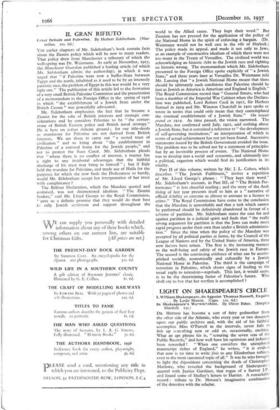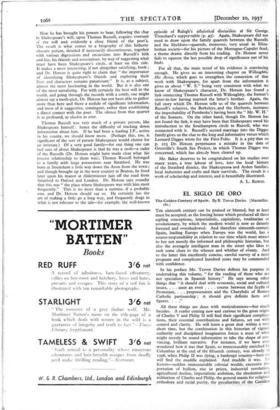LIGHT ON SHAKESPEARE'S CIRCLE In Shakespeare's Warwickshire. By Oliver Baker.
(Simpkin Marshall. z5s.) DR. Harsort has become a sort of fairy godmother from
the other side of the Atlantic, who every year or two descends upon our public archives and, with the aid of his faithful accomplice Miss O'Farrell in the intervals, never fails to fish up scm !thing new or . odd or, occasionally, exciting. What an apt phrase his is, "scouring the seven seas of the Public Records," and 'how well have his optimism and industry
been rewarded ! "When one considers the unexplored manuscript riches of England," he writes, "it is evident that now is no time to write finis to any Elizabethan subject, even to the most canvassed topic of all." It was he who brought to light the deposiiioni concerning the death of Christopher
Marlowe, who revealed the background of Shakespeare s
quarrel with Justice Gardiner, that rogue of a Surrey J.13-, and found some of Shelley's letters' to Harriet. A reniarkablf: record : tribute to Dr. Hotson's imaginative combination
of the detective with the scholar.
- Now he has brought his powers to bear, following the -clue in Shakespeare's will, upon Thomas Russell, esquire, overseer of the will and evidently a close friend of the poet* The result is what comes to a biography of this hitherto obscure person, detailed if necessarily discontinuous, together with various digressions and excursions into Russell's kith and kin, his friends and associations, by way of suggesting whit must have been Shakespeare's circle, at least on this side. It makes a most interesting, if not altogether satisfying, book ; and Dr. Hotson is quite right to claim that" the importance of identifying Shakespeare's friends and exploring their lives and characters remains paramount." It is, as a subject, almost the most fascinating in the world. But it is also one of the most tantalising. For with certainly the best will in the world, and going through the records with a comb, one might almost say a tooth-pick, Dr. Hotson has not been able to gather more than here and there a nodule of significant information, and most of it suggestive, contingent, rather than establishing a direct contact with the poet. The silence from that quarter is as profound, as elusive as ever.
Thomas Russell was very much of a private person, like Shakespeare himself : hence the difficulty of tracking down information about him. If he had been a leading J.P., active in his county, we should know more. (Perhaps this, too, is significant of the sort of person Shakespeare would choose for an intimate.) Of a very good family—for one thing one can feel sure of about Shakespeare is that he was a snob—a cadet of the Russells (Dr. Hotson might have made clear what his precise relationship to them was), Thomas Russell belonged to a family with large possessions near Stratford. He was born at Strensham a little way down the Avon from the town; and though brought up in the west country at Bruton, he lived later upon his manor at Alderminster just off the road from Stratford to Oxford and London. Dr. Hotson says roundly that this was "the place where Shakespeare was with him most frequently." This is no more than a surmise, if a probable one, and Dr. Hotson should say so. He certainly has the - art of making a little go a long way, and frequently drags in What is not relevant to the tale—for example, the well-known
-
episode of Rafeih's atheistical disc:union at Sir George
Trenchard's supper-table (p. 43). Again, Shakespeare did not need to draw upon the family quarrels between the Russells and the Sheldons—quarrels, moreover, very usual in Eliza- bethan society—for his picture of the Montague-Capulet feud, a theme drawn directly from his reading. Dr. Hotson never fails to squeeze the last possible drop of significance out of his finds.
For all that, the main trend of his evidence is convincing enough. He gives us an interesting chapter on Willoughbie His Aliso, which goes to strengthen the connexion of that work with Shakespeare, for apart from the information it gives us about "W. S." being very consistent with what we know of Shakespeare's character, Dr. Hotson has found a link connecting Thomas Russell with Willoughby, the former's sister-in-law having married the latter's brother. Again, the full story which Dr. Hotson tells us of the quarrels between Russell's relatives, the Berkeleys, and the Herberts, increases the improbability of Pembroke's having been the "Mr. W. H." of the Sonnets. On the other hand, though Dr. Hotson has not found the link, it may have been that Shakespeare owed his introduction to the Southampton circle to Russell, who was connected with it. Russell's second marriage into the Digges family gives us the clue to the long and informative verses which Leonard Digges wrote for the First Folio. It is a pity that on p. 223 Dr. Hotson perpetuates a mistake in the date of Grenville's South Sea Project, in which Thomas Digges was concerned, which has already been cleared up.
Mr. Baker deserves to be congratulated on his studies over many yeaks, a true labour of love, into the local history of the Stratford district, the Shakespeare. and Arden families, local industries and crafts and their survivals. - The result is a work of scholarship and interest, and is beautifully illustrated.
A. L. ROWSE.























































 Previous page
Previous page